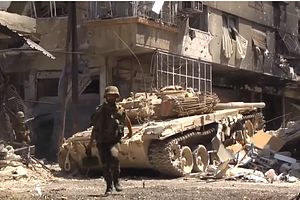The past year has seen an upturn in the fortunes of Syria’s government. President Bashar al-Assad and his armed forces have reduced the Islamic State threat in the east of the country and made advances in the south of the country. This month he took back control of Deraa, where the uprising first began, back in 2011.
Despite the government’s evident satisfaction over reclaiming much of its national territory, it all comes with a huge challenge. Following seven years of war, much of the country is now in ruins, with homes, schools, hospitals, and factories destroyed.
Syria needs help to rebuild. And herein lies the problem. Many of the (mostly Western) donors with the most money are also the least sympathetic to the regime. Last year, 70 countries and institutions met in Brussels to discuss how to help rebuild Syria without helping Assad at the same time. But while they propose funneling money to firms and NGOs directly, there’s no guarantee that they can avoid the government getting involved.
In response, Damascus has instead reached out to other parties that it trusts more. Assad has pointed out that Syria has “good relations” with countries like China and Russia while his ambassador to Beijing, Imad Moustapha, has said that because “China, Russia, and Iran have provided substantial support to Syria during the military conflict… [they] should play a major role in the reconstruction of Syria.”
However, it won’t be a harmonious affair, as the three compete for contracts and business opportunities. Already tensions have emerged between Iran and Russia this year. But both are unlikely to be able to offer the sums that China can. In addition to the $2 billion Beijing has already pledged to invest in Syrian industry last year, Beijing used the recent China-Arab States Cooperation Forum this month to announce a further $23 billion in loans and aid for the Arab region (and including $90 million in humanitarian aid to Yemen, Lebanon, Jordan, and Syria).
While welcome, China’s offer will most likely be only a drop in the ocean for Syria itself. Damascus has calculated that it could cost $195 billion to rebuild the country, while the World Bank estimates that it could be up to $250 billion – four times Syria’s GDP in 2010.
It’s also not clear how much of the proposed $23 billion will go to Syria either. Previously, Syria has not had the same economic significance, impact, or return for China as other oil and gas-producing countries in the region, like Iran and the Arab Gulf states, have had.
Syria’s marginal status won’t be helped in a number of other ways. One is the uncertainty associated with undertaking reconstruction when the war has not yet ended. Chinese firms may be unwilling to invest if there’s a possibility of the opposition pushing back and violence returning. They may therefore prefer to put their resources in more reliable and domestically stable places, like Dubai and Doha.
Another issue is the Syrian government’s apparent unwillingness to resolve the causes that led to the uprising and subsequent civil war in the first place. Recently, the government has pushed ahead with measures like Law 10, which may only exacerbate grievances. Law 10 sets out the framework for land usage and how developers can obtain contracts. As well as limiting the involvement of local councils, it also narrows the time period that people must prove ownership of their property to two months – an action that will disenfranchise many of the country’s 8 million refugees and internally displaced people, many of whom fled the regime and are fearful of returning.
Law 10 goes against much of the advice regarding post-war transitions. The World Bank has said that violence tends to beget violence. To break its cycle, governments and donors alike should pursue policies that build public confidence and trust by providing security, schools, healthcare, and jobs. The critical peace studies scholar Roger Mac Ginty has made similar points: reconstruction is difficult if governments don’t address issues like the repatriation of refugees, reforming the security sector, or pursuing policies to ensure social and political cohesion.
So far China shows little sign of echoing these views – or persuading the Syrian government to do so. Instead, China’s foreign minister, Wang Yi, said last November that the solution to Syria’s problems lay in continuing its counterterrorist efforts while also carrying out a dialogue and negotiation with the opposition to reach a political settlement. Reconstruction’s role would be the “guarantee” for the final agreement.
The problem with this advice is that China won’t make clear who may be a partner to talks, since that would mean interfering in another country’s internal affairs. That would go against one of its Five Principles of Peaceful Coexistence. Taking advantage of this helpful ambiguity, Assad set limits on what he is prepared to discuss at the UN-backed Geneva talks last December and refused to consider the constitutional process or presidential elections. If he was confrontational then, he is even more so now, given the momentum associated with his recent military successes.
Despite the Syrian government’s present strength, it needs Chinese resources and investment. China is therefore in a strong position to shape Syria’s post-war future. So far, it hasn’t done so. Instead, its unwillingness to use its influence with Syria may potentially prolong the underlying grievances, making any settlement uncertain and insecure. That will only compound matters further and restrict Chinese participation in the government’s reconstruction efforts still further.
Guy Burton is Assistant Professor at the Mohammed Bin Rashid School of Government in Dubai. His research interests concern the politics and international relations of the Middle East and the role and impact of emerging powers. His most recent publication is Rising Powers and the Arab-Israeli Conflict since 1947 (Lexington, 2018).

































